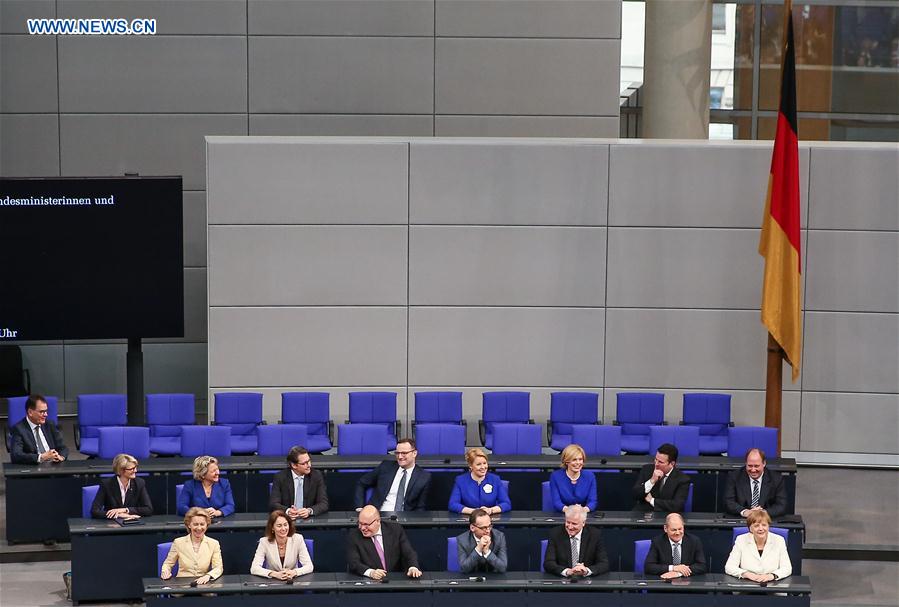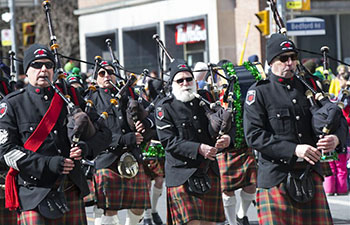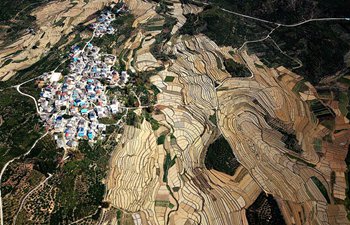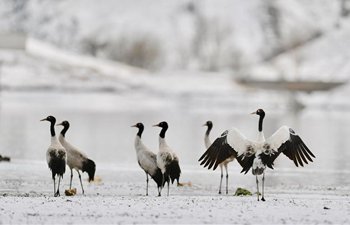
German chancellor Angela Merkel (front, R) and ministers of her new cabinet attend the swearing-in ceremony at the parliament in Berlin, Germany, March 14, 2018. German new government was sworn in on Wednesday with Angela Merkel kicking off her fourth term as the leader of Europe's largest economy thanks to her re-election as chancellor by the parliament. (Xinhua/Shan Yuqi)
by Ren Ke
BERLIN, March 14 (Xinhua) -- Almost half a year after the Sept. 24 federal elections, German new government was finally sworn in on Wednesday with Angela Merkel kicking off her fourth term as the leader of Europe's largest economy thanks to her re-election as chancellor by the parliament.
"I swear that I will devote my strength to the good of the German people," said Merkel when taking oath with her right hand raising in front of Wolfgang Schauble, speaker of the Bundestag, the lower house of German Parliament.
Merkel is no stranger to the oath, as it was her fourth time to read it at chancellor's swearing-in ceremony.
But what made this time some different is the long wait before it finally happened, 171 days after the federal elections, the longest time span in post-war Germany.
The over-fragmented results in the federal elections led to difficulties in government formation, a major reason for the long-term vacuum of new government.
After rounds of negotiations, the Union Party led by Merkel finally signed a government coalition agreement on Monday with the Social Democratic Party (SPD).
It was also the third "Grand Coalition" and the second consecutive one between the two biggest parties in Germany.
The ensuing election for chancellor was only a procedure for the chancellor and the cabinet to formally take office.
Among the total 709 seats of the Bundestag, Merkel, the candidate of the coalition between her Conservatives Union and the SPD, won a total of 364 votes, securing an absolute majority, but only nine votes more than that.
The "Grand Coalition" in the Bundestag has 399 seats, 35 more than the votes Merkel received to become chancellor.
After being elected as chancellor, Merkel was greeted by leaders of different parties in the Bundestag, including the far-right populist Alternative fuer Deutschland (AfD).
Merkel later met with German President Frank-Walter Steinmeier to present her cabinet as a ritual, while Steinmeier appealed to a balance of social justice and economic rationality.
The new German government was finally formed after 14 ministers, six from the SPD and eight from the Union, were sworn in in front of Schauble on the Afternoon.
Elisabeth Motschmann, a Bundestag member from the Union, told Xinhua that the new government has a lot of work to do.
"We need to do more to Europe firstly and then we will also look overseas to other regions. We are strong economically," said Motschmann, chairwoman of Committee on Culture and Media of Bundestag.
The German new government will face the opposition of the AfD in the Bundestag. As the third largest party in the parliament, AfD believed that they are the real opposition party.
"I did not vote for her," said Juergen Pohl, an AfD MP from Thuringia told Xinhua, explaining that "The government does not give enough support to the east."















